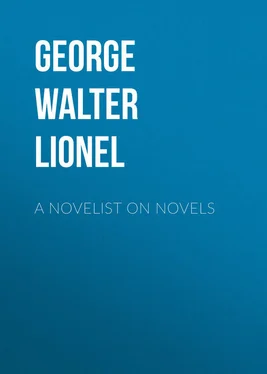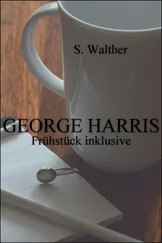Walter George - A Novelist on Novels
Здесь есть возможность читать онлайн «Walter George - A Novelist on Novels» — ознакомительный отрывок электронной книги совершенно бесплатно, а после прочтения отрывка купить полную версию. В некоторых случаях можно слушать аудио, скачать через торрент в формате fb2 и присутствует краткое содержание. Жанр: foreign_antique, foreign_prose, foreign_sf, на английском языке. Описание произведения, (предисловие) а так же отзывы посетителей доступны на портале библиотеки ЛибКат.
- Название:A Novelist on Novels
- Автор:
- Жанр:
- Год:неизвестен
- ISBN:нет данных
- Рейтинг книги:3 / 5. Голосов: 1
-
Избранное:Добавить в избранное
- Отзывы:
-
Ваша оценка:
- 60
- 1
- 2
- 3
- 4
- 5
A Novelist on Novels: краткое содержание, описание и аннотация
Предлагаем к чтению аннотацию, описание, краткое содержание или предисловие (зависит от того, что написал сам автор книги «A Novelist on Novels»). Если вы не нашли необходимую информацию о книге — напишите в комментариях, мы постараемся отыскать её.
A Novelist on Novels — читать онлайн ознакомительный отрывок
Ниже представлен текст книги, разбитый по страницам. Система сохранения места последней прочитанной страницы, позволяет с удобством читать онлайн бесплатно книгу «A Novelist on Novels», без необходимости каждый раз заново искать на чём Вы остановились. Поставьте закладку, и сможете в любой момент перейти на страницу, на которой закончили чтение.
Интервал:
Закладка:
It is perhaps in search of dignity and status that the modern novelist has taken to journalism. Journalism raises a novelist's status, for a view expressed by a fictitious character is not taken seriously, while the same view fastened to an event of the day acquires importance, satisfies the specific function of the press, which is more and more that of a champion of found causes. The newspaper is a better jumping-off ground than the pulpit or the professorial chair; it enjoys a vast circulation, which the novel does not; it conveys an idea to millions of people who would never think of buying a newspaper for the sake of an idea, but who buy it for news, murder cases or corn market reports; it is a place where a writer may be serious, because the newspaper is labelled as serious, while the novel is labelled as frivolous .
This is vital to the proposition, and explains why so many novelists have sought refuge in the press. It is not exactly a question of money. Journalism rewards a successful novelist better than does the novel, though successful novelists make very good incomes; they often earn as much as the red-nosed comedian with the baggy trousers and the battered bowler. Thackeray, Washington Irving, Kingsley, and notably Dickens, knew the value of journalism. Dickens was the most peculiar case, for it is fairly clear that Nicholas Nickleby helped to suppress the ragged schools and that Oliver Twist was instrumental in reforming workhouse law; both works were immensely successful, but Dickens felt that he wanted a platform where he could be always wholly serious: for this the Daily News was born in 1846. Likewise Mr Wells has written enormously upon the war and economics; Mr Arnold Bennett has printed many political articles; Mr Galsworthy has become more direct than a novelist can be and written largely on cruelty to animals, prison reform, etc. It is the only way in which we can be taken seriously. We must be solemn, a little dull, patriotic or unpatriotic, socialistic or conservative; there is only one thing we may not be, and that is creative and emotional.
It should be said in passing that even the press does not think much of us. Articles on solid subjects by novelists are printed, well paid for, sought after; it does a paper good to have an article on Imperial Federation by Mr Kipling, or on Feminism by Mr Zangwill. The novelist amounts to a poster; he is a blatant advertisement; he is a curiosity, the man who makes the public say: 'I wonder what the Daily – is up to now.' Be assured that Mr Zangwill's views on Feminism do not command the respectful treatment that is accorded a column leader in the Times ; he is too human; he sparkles too much; he has not the matchless quality of those leaders which compels you to put on an extra stamp if you have to send the paper through the post.
The newspapers court the novelist as the people of a small town court the local rich man, but neither newspaper nor little town likes very much the object of its courtship. Except when they pay us to express them, the newspapers resent our having any views at all; the thought behind is always: 'Why can't the fellows mind their own business, and go on writing about love and all that sort of stuff?' During the war, references to novelists who express their views have invariably been sneering; it is assumed that because we are novelists we are unable to comprehend tactics, politics, in fact any 'ics,' except perhaps the entirely unimportant aesthetics. But the peculiarity of the situation is that not a voice has been raised against professors of philology, who write on finance, against Bishops dealing with land settlement, against doctors when they re-map Europe, against barristers, businessmen… These may say anything they like; they are plain, hard-headed men, while our heads are soft enough to admit a new idea.
To define the attitude of the press is in modern times to define the attitude of the State. From our point of view this is frigid. In America, there are no means of gauging a novelist's position, for American classification rests upon celebrity and fortune. Ours rests upon breeding and reliability. America is more adventurous; Britannia rides in a chariot, while the American national emblem foreshadowed the aeroplane. And so, in the United States it may profit a man as well to be a Jack London as an Elihu Root. America has no means of recognising status, while in England we have honours. We distribute a great many honours, and indeed the time may come, as Mr Max Beerbohm says, when everybody will be sentenced to a knighthood without the option of a fine. Honours are rather foolish things, monuments that create a need for circumspection; they are often given for merits not easily perceived, but still they are a rough test of status. Setting aside money, which is the primary qualification, and justifies Racine in saying that without money honour is nothing but a disease, a title is a fairly clear sign of distinction. Sir Edward Shackleton, Sir Douglas Haig, Sir Frederick Treves, Lord Reading, Sir William Crookes, Lord Lister, all those titles are obvious recognition of prominence in Polar Exploration, the Army, the Law, Medicine, Research, as the case may be; there are scores of Medical Knights, many Law Lords, many Major Generals and Admirals endowed with the Knight Commandership of the Bath. We do not complain. They deserve their honours, most of them. They deserve them more than the politicians who have received for long service rewards that ability could not give them, than the Lord Mayors who are titled because they sold, for instance, large quantities of kitchen fenders. When we consider the arts, we observe a discrepancy. The arts do not ask for honours; they are too arrogant, and know that born knights cannot be knighted. Only they claim that an attempt should be made to honour them, to grant them Mr Gladstone's and Mr Chamberlain's privilege of refusing honours.
Consider, for instance, the Order of Merit, one of the highest honours that the British Crown can confer. At the end of last year it numbered twenty-one members. Among them were some distinguished foreigners, Prince Oyama, Prince Yamagata and Admiral Togo; historians, pro-consuls, four Admirals … and one novelist. Mr Thomas Hardy. We do not complain that only Mr Thomas Hardy was chosen, for there is nobody else to set at his side … only we do complain that in this high order four admirals find a place. Are we then so rich in admiralty, so poor in literature? The same is still truer when we come to the inferior orders, which are still fairly high, such as the Commandership of the Bath. That ancient order is almost entirely recruited from amongst soldiers, sailors, politicians, and civil servants; it does not hold the name of a single novelist. No novelist is a Privy Councillor, though the position is honorific and demands no special knowledge. On the Privy Council you find labour members of Parliament, barristers, coal owners, sellers of chemicals and other commodities, but no novelists. In all the other orders it is the same thing; for novelists there are neither commanderships of the Bath, nor of the Victorian Order, nor of St Michael and St George, no honours great or minor; no man has ever in England been offered a peerage because he wrote novels; and yet he has been offered a peerage because he sold beer. George Meredith was not offered a peerage, even though some think that his name will live when those of captains and kings have melted into dust. Our little band of recognised men, such as Sir James Barrie, Sir Anthony Hope Hawkins, Sir Rider Haggard, Sir Arthur Conan Doyle, small is the toll they have taken of public recognition; perhaps they should not expect it; perhaps they have been recognised only because of certain political activities; but must we really believe that so many lawyers and so few writers are worthy of an accolade? Is the novelist worthless until he is dead?
Читать дальшеИнтервал:
Закладка:
Похожие книги на «A Novelist on Novels»
Представляем Вашему вниманию похожие книги на «A Novelist on Novels» списком для выбора. Мы отобрали схожую по названию и смыслу литературу в надежде предоставить читателям больше вариантов отыскать новые, интересные, ещё непрочитанные произведения.
Обсуждение, отзывы о книге «A Novelist on Novels» и просто собственные мнения читателей. Оставьте ваши комментарии, напишите, что Вы думаете о произведении, его смысле или главных героях. Укажите что конкретно понравилось, а что нет, и почему Вы так считаете.












